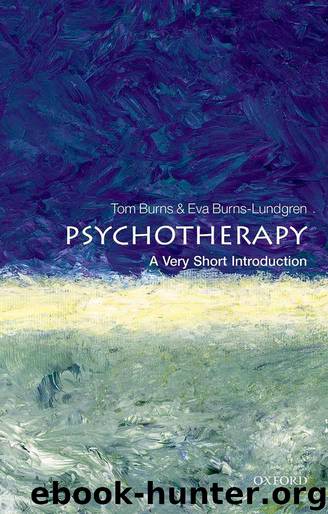Psychotherapy: A Very Short Introduction (Very Short Introductions) by Tom Burns

Author:Tom Burns [Burns, Tom]
Language: eng
Format: epub, azw3, mobi
ISBN: 9780199689361
Publisher: Oxford University Press
Published: 2014-11-25T00:00:00+00:00
Chapter 5
Counselling
Many more of us will see a counsellor than ever be treated by a psychotherapist. Family doctor surgeries, colleges and schools, and many workplaces now employ counsellors. How is counselling different from psychotherapy? The word has several meanings—from a careers counsellor who advises on jobs, to being ‘counselled’ (told off) about work performance. In this book counselling refers to a confidential relationship between a client (the term preferred by counsellors, rather than patient) and an individual who is trained to listen attentively and who will try and help you improve things through support and understanding. What is the difference, then, between counselling and psychotherapy? This is a good question, but one that is not easy to answer. The boundaries are blurred and no definition pleases everyone. However, there are some recognizable and useful differences.
Overall, counselling is less formal than psychotherapy, and the relationship between counsellor and client more equal. The word counselling itself is a bit less ‘threatening’ and therapists working in schools or colleges are often referred to as counsellors to reduce anxiety about going to see them. Counselling also tends to be shorter, often just half a dozen sessions. It is rarely more than once a week and is usually less expensive. Most counselling training focuses predominantly on the use of counselling skills and on building the therapeutic relationship rather than on any complex model of mental functioning. It is generally less theory-laden. This does not mean there are no guiding principle, or that counsellors make it up as they go along, but you are unlikely to have a sense that a specific interpretation of your problems is imposed on you or on the process. As with psychotherapy, counselling can focus on specific symptoms or on more general problems of living. There are times when counselling is preferable to more formal psychotherapies, as in coping with acute and overwhelming events such as a bereavement or a relationship break-up.
Initially there was no training requirement for counsellors. Individuals with a wide experience of human life and with a warm and tolerant personality simply ‘became’ counsellors. Although still very variable in length and intensity, training requirements are becoming more formalized. Many counsellors in the UK are registered with the British Association of Counselling and Psychotherapy (BACP), although they are not required to be. To be registered they need to have completed a recognized training course, many of which require them to have spent some time in counselling themselves. They must have a supervisor with whom to discuss practice and keep up to date with their subject. The BACP was originally the British Association of Counselling, but it added Psychotherapy in 2000 as counselling training became more sophisticated. The name in itself is emblematic of the overlap between counselling and psychotherapy, which we have outlined. Let us start with the fundamentals of counselling practice, before describing some approaches in more detail.
Download
Psychotherapy: A Very Short Introduction (Very Short Introductions) by Tom Burns.azw3
Psychotherapy: A Very Short Introduction (Very Short Introductions) by Tom Burns.mobi
This site does not store any files on its server. We only index and link to content provided by other sites. Please contact the content providers to delete copyright contents if any and email us, we'll remove relevant links or contents immediately.
Rewire Your Anxious Brain by Catherine M. Pittman(18656)
Talking to Strangers by Malcolm Gladwell(13371)
The Art of Thinking Clearly by Rolf Dobelli(10489)
Mindhunter: Inside the FBI's Elite Serial Crime Unit by John E. Douglas & Mark Olshaker(9344)
Becoming Supernatural by Dr. Joe Dispenza(8218)
Change Your Questions, Change Your Life by Marilee Adams(7783)
Nudge - Improving Decisions about Health, Wealth, and Happiness by Thaler Sunstein(7709)
The Road Less Traveled by M. Scott Peck(7603)
The Lost Art of Listening by Michael P. Nichols(7506)
Mastermind: How to Think Like Sherlock Holmes by Maria Konnikova(7347)
Enlightenment Now: The Case for Reason, Science, Humanism, and Progress by Steven Pinker(7314)
Win Bigly by Scott Adams(7199)
The Way of Zen by Alan W. Watts(6615)
Daring Greatly by Brene Brown(6514)
Big Magic: Creative Living Beyond Fear by Elizabeth Gilbert(5775)
Grit by Angela Duckworth(5615)
Ego Is the Enemy by Ryan Holiday(5450)
Men In Love by Nancy Friday(5240)
The Laws of Human Nature by Robert Greene(5209)
